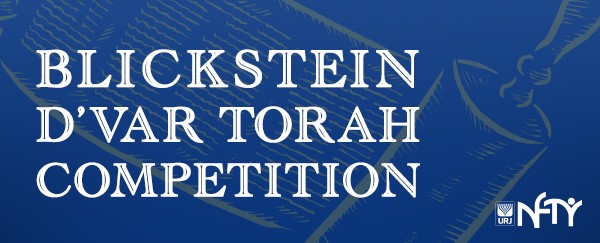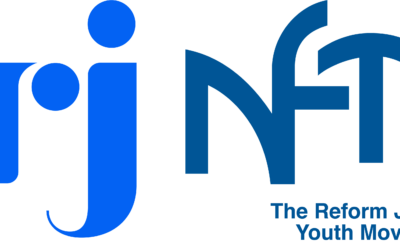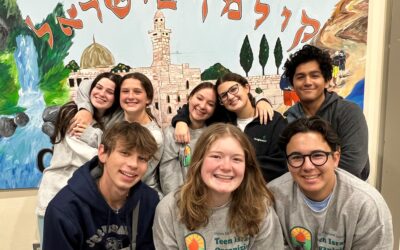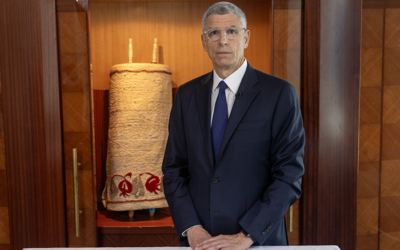This essay is the winning entry for this year’s Blickstein D’var Torah Competition.
By April Springer
The Torah is this incredible document, this guidebook, this unification of the Jewish people. Comprised of epic tales of stealing birthrights, or stories of the heart-wrenching near-sacrifice of a young child at the peak of a mountain: The Torah threads a unique message and moral through each and every story that it details. The Torah, however, is not simply a saga of thrilling adventures, but also a manual: a set of how-to’s on creating the unique Jewish culture that encapsulates our lives today. While these passages tend to be befuddling and complicated, it would be a mistake to disregard them as insignificant: they not only define the culture of us as a Jewish community, but carry undeniable meanings about our characters and who we are as a Jewish people. And while all segments of the Torah may not tell us a story about the past, they give us a way to tell our story for the future: a gift that carries a distinct and incredible power.
The Parashat Tetzaveh begins by dictating the process of adorning the Kohen Gadol, or the High Priest, Aaron, in the priestly garments. After being bestowed with the garments of a normal priest, Aaron receives the uniform special to his esteemed post as the Kohen Gadol, consisting of a special cape, a colorful apron, a golden plate to be placed on the Kohen’s forehead, and a breastplate with twelve precious stones engraved on its surface.
This process of dressing Aaron in the clothes that are exclusive to the High Priest is sacred. It is a process that is personal to Aaron, and not only clothes him in a unique set of garments, but gives him a symbol and a uniform, a job to live up to. It is one that recognizes him as one of the most powerful, respected, and holy leaders of the Jewish people. With the giving of these holy clothes, Aaron is being initiated into a position that towers above that of any priest. Yet, instead of focusing on Aaron during his initiation into priesthood, the Torah focuses on how Aaron is constantly accommodated by his sons Nadab, Abihu, Ithamar, and Eleazar. Why was it that Aaron’s younger sons were given the opportunity to experience the consecration of their father as the High Priest as he receives his particular outfit?
To understand the sons’ presence further, we look to a story in the Talmud about a man named Choni the Circle Maker. One day, Choni was walking along his path, when he saw a man planting a carob tree. Curious, Choni asked the man, “This tree, how long will it take for it to bear fruit?” And the man responded dutifully and honestly, “70 years.” Choni was appalled. 70 years? That’s a really long time for a tree to grow. Why would anyone plant a tree that wasn’t even going to bear fruit in their lifetime? When Choni asked the planter this question, the man simply responded, “My grandparents planted a carob tree so that I would be able to reap its fruit. Now I shall do the same for my grandchildren.” Choni, perplexed by the man’s perspective on the future, did what anyone would do after such a confusing conversation: He sat down for a nice meal and then settled in for a quick nap. But little did Choni know, his “quick nap” morphed into a 70-year deep sleep. When he woke up, he saw a young man plucking the fruit from a fully-grown carob tree. He rubbed his eyes and sauntered over to the man. “Hey,” he said. “Did you plant this tree?” And the man shook his head. He said, “My grandfather planted this tree for me, knowing that seventy years later, it would grow into something that I could cherish and use.”
Choni’s story teaches us that we not only have the responsibility to make the world as good a place as we can while we are alive, but it is our responsibility to plant carob trees: to grow it and take care of it for the generations to come. It instills in the Jewish people the importance of having respect and compassion for the people that make up the future.
Thus, Aaron’s sons’ presence in the ritual of the priestly garments is not an intrusion on a private anointment, yet it is the planting of a seed of a carob tree. It is planting the concept and the tradition of the priestly garments in the minds of Aaron’s sons for them to nurture and to grow for the future. It is the compassion to care about and to be inclusive of the generations to come, and to build a community and a world that our descendants will be able to cherish and thrive in. L’dor v’dor – from generation to generation. From Aaron, to his sons, and now to us: we are reminded of the responsibility that we carry, not only to ourselves and the world we live in today, but to the world that follows us. By bringing his sons into such a holy experience, Aaron was not only exemplifying the importance of caring for the future, but that being priestly, learning tikkun olam (repairing the world), or gemilut hasadim (deeds of loving-kindness), does not discriminate. Regardless of age, everyone has the power and the responsibility to make a difference.
In a way, Parashat Tetzaveh has become prophetic, truly encapsulating the strength of our generation in its text. In the past year or so, we have seen some of the greatest passion, some of the most widespread mobilization, and some of the most powerful strength in young people that we’ve seen in centuries. This year alone, thousands of people swarmed Washington D.C to join the March for Our Lives, led and organized by students, not to simply advocate for young people but to hear them speak truth to power. We have teen-led movements like the global environmental organization entitled Zero Hour, founded by a 16-year-old named Jamie Margolin who just wanted to address and alleviate the shift in our climate. And we have NFTY, the youth movement that has brought each and every one of us here today, and that has instilled and taught us the message that the pursuit of justice belongs in the hands of teenagers like you and me. These organizations and these young people are planting their legacy and changing the world today so that we may have a better tomorrow.
So, it is time to make our difference, to think about how we will take this world that we have been given, this carob tree that has been left for us, and how we will plant the seeds for our descendants. Because we are powerful, and we are strong, and we have the gift of being able to change the future of our story.
 April Springer is a high school junior in Chapel Hill, NC, where she and her family belong to Judea Reform Congregation in Durham, NC. She is active in the temple youth group, Durham Regional Temple Youth, where she served as the social action and programming vice president. April also is involved in the NFTY Mid-Atlantic Region, where she serves as programming chair. She’s passionate about environmental social justice, loves speaking French, traveling, playing the ukulele, and hanging out with her dog. April is honored to have won this year’s Blickstein D’var Torah Competition and is excited to deliver her d’var Torah at this weekend’s NFTY Convention.
April Springer is a high school junior in Chapel Hill, NC, where she and her family belong to Judea Reform Congregation in Durham, NC. She is active in the temple youth group, Durham Regional Temple Youth, where she served as the social action and programming vice president. April also is involved in the NFTY Mid-Atlantic Region, where she serves as programming chair. She’s passionate about environmental social justice, loves speaking French, traveling, playing the ukulele, and hanging out with her dog. April is honored to have won this year’s Blickstein D’var Torah Competition and is excited to deliver her d’var Torah at this weekend’s NFTY Convention.





